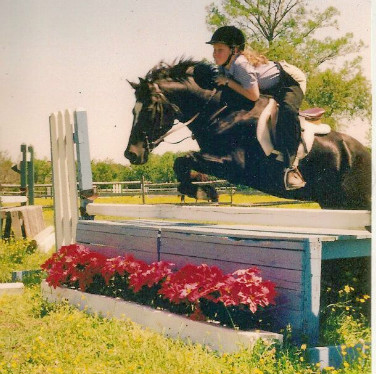After spending four months in equine fantasyland I returned home to my quaint, rustic, little farmette in Purcellville, Va. We use words like “quaint” and “rustic” to invoke a sense of charm, some far off nostalgia for tin roofs and chickens pecking around. But words like “small” and “old” are more accurate.
Don’t get me wrong, my place isn’t bad. And once I got my heart rate down, I remembered that the last four months of brass finials and chandeliered aisles were quite possibly some strange bourgeois hallucination, and that your average boarder cares far more about the care and training their horse receives; not necessarily the presence or absence of a modern art sculpture in the courtyard.
Small is OK. Old is also OK. It’s important not to forget where you came from. If you had shown 10-year-old me the barn that I now have, I would have done a back flip. It has a center aisle and the roof doesn’t leak. It’s not a listing shed row with doors that require a hockey player-style body check to close.
I’m thankful for being raised in a barn, period, but I’m especially thankful that I was raised in an old barn. I learned a wide array of useful life skills like post hole digging, roof patching, carpentry of all kinds, golf cart rally driving, containment of escape artist equines, poultry management and basic plumbing to name a few. Of course, at the time, I looked over the fence at the neighbor’s modern, center aisle barn with its concrete floors and ceiling fans, and pined for that rubber-matted world. But I am so grateful that it was withheld from me.
For one thing, I think it has made me pretty darn self-sufficient. Thinking back, whether she realized it or not, every day we spent out at “the farm,” my mom showed me that there is no task that we girls could not do. She never suggested that we wait until a man showed up to move a fallen tree; she cranked up the chainsaw and got to work.
For those of you who don’t know my mom, she does not resemble an Amazonian Olympic weight lifter. Rather, she’s dainty (a trait I often wish I had inherited instead of my boyish, Viking frame. If I was a horse, you’d say that I have a lot of bone). Every day she showed my sister and me that there’s a solution to every problem, and typically that means being smarter, not stronger.
ADVERTISEMENT
She taught me that simply wanting something would not make it materialize. And bemoaning the leaky roof would not make the water stop coming in. But climbing the ladder and smearing black tar over the rusted nail holes in the scorching summer sun would. And thinking about it now, these life lessons translated to my education in the saddle too. Most of the ponies we rode as children ended up with us because they had flunked out of another program and/or were completely unbroke. My sister and I, being the wannabe local horse show point chasers that we were, desperately wanted to be competitive. Wanting the pony to do the lead change wasn’t enough. We had to climb the ladder and fill in the holes with training.
Growing up in the shed row with its peeling blue paint and patchwork architecture allowed me to love my horses more than my ribbons. Despite the burning desire for local horse show stardom, we learned (with some difficulty) that there is much more to riding than show results. Yes, sometimes we had a really good weekend and came home with a prize, but more often than not, our green horses would do green horse things, and a compassionate judge might give us a low ribbon in the hack if we maintained composure.
Learning to lose not only made winning (on the rare occasion it happened) all that much sweeter, but it prevented me from defining my relationship with horses by how many awards I’d won. The low pressure, grassroots feel of where I came from taught me early on that the success or failure of a competition is not the color of the ribbon you come home with but the experience you had. And I carry that with me today; when I compete, I don’t go out to “beat” anyone but myself. I aim to ride the absolute best I can and give the horse a good experience. And if I’ve done both of those things, then as far as I’m concerned, I’ve won the day.
I’m fortunate that as a professional I am asked to ride some lovely horses at some spectacular locations—some with chandeliers, some without. But what I’ve learned is that it’s not the place that makes the barn great, it’s the attitude of the people there. As set up my little barn and hose down the dusty dirt aisle at the end of a long day of training, I am proud of where I came from and excited about where I’m going.
Chronicle blogger and up and coming hunter/jumper trainer Paige Cade spent most of the 2015 FTI Winter Equestrian Festival working for Margie Engle’s Gladewinds Farm, and has recently made the decision to return to Virginia to start her own riding and training business, Country Fox Farm, Inc. Read all her blog entries.















